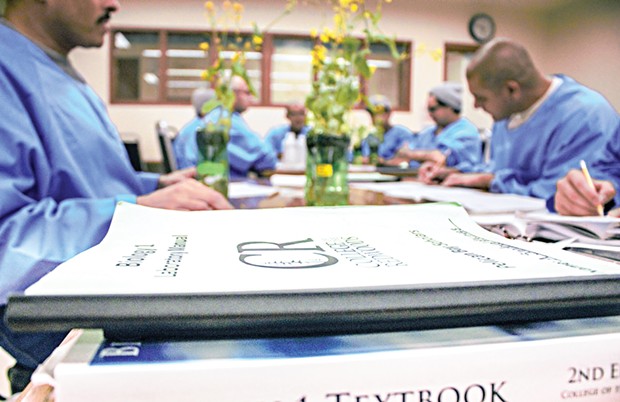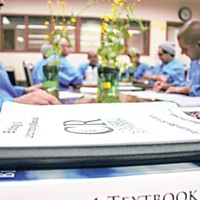Monday, January 29, 2024
'First in the Country': Incarcerated Students in CPH Degree Program Now Eligible for Federal Financial Aid
Posted By Kimberly Wear @kimberly_wear on Mon, Jan 29, 2024 at 3:14 PM
Incarcerated students enrolled in a groundbreaking program at Pelican Bay State Prison to earn their bachelor’s degrees from Cal Poly Humboldt are now the first in the nation eligible to receive Pell Grants to pay for their education.
Access to the aid opened up this summer under federal legislation signed in 2020, reversing a previous policy that denied the financial aid to prisoners for nearly 30 years.
In a CPH news release, Assistant Secretary of the U.S. Department of Education’s Office of Career, Technical and Adult Education Amy Loyd said the change will provide the students “an opportunity to create a new vision and future for themselves by acquiring the knowledge, skills and abilities to thrive and build better lives.”
“We congratulate Cal Poly Humboldt for being the first school in the country to be approved to provide a Pell eligible prison education program inside of a correctional facility,” she said. “Education has the power to transform lives, families and communities and it opens doors to rewarding careers and meaningful civic engagement.”
The first cohort of 16 Department of Communications majors started classes this month, becoming the first inmates serving time in a California maximum security yard — the most restricted level of incarceration in the state — with access to in-person instruction as they work toward a four-year degree.
Slated to receive their diplomas in 2028, each of the students now enrolled already graduated from the College of the Redwoods' Pelican Bay Scholars program, which has given hundreds of inmates at the Crescent City facility access to community college classes since beginning in 2015, with more than 100 receiving an associate degree over the years.
“Education is a medicine for recidivism,” says Tony Wallin-Sato, a CPH graduate with his own experience behind bars who lobbied campus officials to bring the four-year degree offering to Pelican Bay. Wallin-Sato also helped launch the Humboldt chapter of Project Rebound — a program aiming to enroll and support formerly incarcerated students in the California State University system.
Studies show that access to educational opportunities in prison substantially reduces a person's likelihood of returning and increases their ability to find work once released, benefiting not only the individual but their families and society as a whole.
Those studies include research from the RAND corporation cited in the CPH release, which found that “every dollar invested in correctional education saves nearly five in reincarceration costs over three years.”
“College is transformative and a tremendously powerful rehabilitative tool — that’s why [the California Department of Corrections and Rehabilitation] is committed to providing grade-school-to-grad school opportunities for all incarcerated individuals,” Shannon Swain, CDCR’s superintendent of correctional education, said in the release. “Pell Grants will allow even more students to access these life-changing programs and meet their goals. We are thrilled that our partners at Cal Poly Humboldt are leading the way in ensuring students housed at Pelican Bay State Prison can utilize these vital funds and look forward to seeing this access and programming blossom statewide.”
Across California, nine prisons — including Pelican Bay — offer access to degree programs in conjunction with colleges, with CPH being the latest to join an expanding list. About 13.5 percent of the state's entire incarcerated population is now taking college courses, according to CDCR.
In the release, CPH Provost and Vice President of Academic Affairs Jenn Capps, whom Wallin-Soto has credited with being an early supporter of the program, describes CPH as a campus that defines itself "by who we include and not who we exclude."
“Creating access to education is one of our primary goals and launching the bachelor's degree at Pelican Bay, the first bachelor's degree in a Level IV yard in California, does just that — creates access to education, improves outcomes for people who are incarcerated and increases community safety,” she said.
Now overseeing CPH’s Project Rebound, Wallin-Soto previously told the Journal ("‘Game Changer,’" Nov. 30, 2023) that he sees opening up Pell Grant access to incarcerated students as more than a potential funding path but also an important shift in narrative, "just in terms of letting students know, 'Hey, you do belong in the classroom ... this is something that should be provided to you, not only because you are human beings but on a recidivism level."
Leaving prison with a degree, he told the Journal, makes an “astronomical difference.”
Access to the aid opened up this summer under federal legislation signed in 2020, reversing a previous policy that denied the financial aid to prisoners for nearly 30 years.
In a CPH news release, Assistant Secretary of the U.S. Department of Education’s Office of Career, Technical and Adult Education Amy Loyd said the change will provide the students “an opportunity to create a new vision and future for themselves by acquiring the knowledge, skills and abilities to thrive and build better lives.”
“We congratulate Cal Poly Humboldt for being the first school in the country to be approved to provide a Pell eligible prison education program inside of a correctional facility,” she said. “Education has the power to transform lives, families and communities and it opens doors to rewarding careers and meaningful civic engagement.”
The first cohort of 16 Department of Communications majors started classes this month, becoming the first inmates serving time in a California maximum security yard — the most restricted level of incarceration in the state — with access to in-person instruction as they work toward a four-year degree.
Slated to receive their diplomas in 2028, each of the students now enrolled already graduated from the College of the Redwoods' Pelican Bay Scholars program, which has given hundreds of inmates at the Crescent City facility access to community college classes since beginning in 2015, with more than 100 receiving an associate degree over the years.
“Education is a medicine for recidivism,” says Tony Wallin-Sato, a CPH graduate with his own experience behind bars who lobbied campus officials to bring the four-year degree offering to Pelican Bay. Wallin-Sato also helped launch the Humboldt chapter of Project Rebound — a program aiming to enroll and support formerly incarcerated students in the California State University system.
Studies show that access to educational opportunities in prison substantially reduces a person's likelihood of returning and increases their ability to find work once released, benefiting not only the individual but their families and society as a whole.
Those studies include research from the RAND corporation cited in the CPH release, which found that “every dollar invested in correctional education saves nearly five in reincarceration costs over three years.”
“College is transformative and a tremendously powerful rehabilitative tool — that’s why [the California Department of Corrections and Rehabilitation] is committed to providing grade-school-to-grad school opportunities for all incarcerated individuals,” Shannon Swain, CDCR’s superintendent of correctional education, said in the release. “Pell Grants will allow even more students to access these life-changing programs and meet their goals. We are thrilled that our partners at Cal Poly Humboldt are leading the way in ensuring students housed at Pelican Bay State Prison can utilize these vital funds and look forward to seeing this access and programming blossom statewide.”
Across California, nine prisons — including Pelican Bay — offer access to degree programs in conjunction with colleges, with CPH being the latest to join an expanding list. About 13.5 percent of the state's entire incarcerated population is now taking college courses, according to CDCR.
In the release, CPH Provost and Vice President of Academic Affairs Jenn Capps, whom Wallin-Soto has credited with being an early supporter of the program, describes CPH as a campus that defines itself "by who we include and not who we exclude."
“Creating access to education is one of our primary goals and launching the bachelor's degree at Pelican Bay, the first bachelor's degree in a Level IV yard in California, does just that — creates access to education, improves outcomes for people who are incarcerated and increases community safety,” she said.
Now overseeing CPH’s Project Rebound, Wallin-Soto previously told the Journal ("‘Game Changer,’" Nov. 30, 2023) that he sees opening up Pell Grant access to incarcerated students as more than a potential funding path but also an important shift in narrative, "just in terms of letting students know, 'Hey, you do belong in the classroom ... this is something that should be provided to you, not only because you are human beings but on a recidivism level."
Leaving prison with a degree, he told the Journal, makes an “astronomical difference.”
Speaking of...
-

SCOTUS on the Homeless, CPH Protest and Local Entertainment
Apr 26, 2024 -

Cal Poly Humboldt Closed as Protesters Occupy Building
Apr 23, 2024 -

Nancy Tobin's CRy-Baby Installation at CR
Feb 22, 2024 - More »
Comments
Showing 1-1 of 1
Readers also liked…
more from the author
-
Dust to Dust
The green burial movement looks to set down roots in Humboldt County
- Apr 11, 2024
-
Our Last Best Chance
- Apr 11, 2024
-
Judge Rules Arcata Can't Put Earth Flag on Top
- Apr 5, 2024
- More »



































